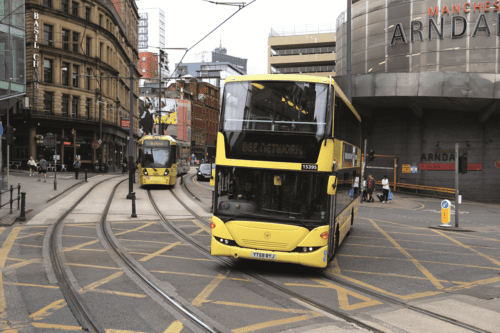
The bill has been introduced to the House of Lords as it makes its way through the legislative process
New legislation to improve buses and boost local control of services moved a step closer on 17 December as the Bus Services Bill was introduced in the House of Lords as it makes its way through Parliament. The Government promises that the bill will ‘put buses back at the heart of communities, enhance connections to work and vital appointments to improve living standards’ and follows its pledge of £1 billion of investment to increase reliability and cap single bus fares at £3.
The plans will lift the ban on local authorities establishing their own bus companies, giving the option for them to control their own bus services and shape routes in a way which they believe will provide the best service. The bill will also empower local authorities to work alongside private operators in partnership to improve bus services if they choose to not pursue full ownership. Additionally, the bill will ensure that lifeline bus services cannot be removed or changed without councils reviewing their ability to serve communities, especially those in rural or deprived areas.
Transport Secretary Heidi Alexander said: “It is high time we recognise that local leaders need to be able to make decisions about their buses. The introduction of the Bus Services Bill marks the next step on our journey to overhaul how bus services operate, delivering on our commitment to improve living standards across the country.”
The bill also aims to improve safety for both passengers and staff by mandating that drivers undertake training to identify and respond to threats of violence against women and girls and anti-social behaviour on buses and at bus stops.
The Government says that the new powers will allow local transport authorities to emulate the success of places like Manchester where Transport for Greater Manchester says that taking buses back under its direct control has ‘massively improved’ reliability and patronage. According to its figures, Manchester’s Bee Network has seen passenger numbers grow by 5% and service reliability improve since the new franchised network began a year ago.
To mark the introduction of the bill, Local Transport Minister Simon Lightwood MP visited Reading to discuss how the new powers will enable local authorities to implement their own improvements. Reading Buses Chief Executive Officer Robert Williams said: “Local ownership, local management and consistent coordinated thinking has allowed us to focus on planning and delivering the best possible network. As our owner, the local authority can guarantee the maximum return on any investment in making bus services even more attractive.”
Commenting on the bill, Director of the Urban Transport Group Jason Prince said: “Buses are the backbone of our public transport system. The introduction of the Bus Services Bill, and its intention to hand more powers to local areas, will herald a smoother ride for the bus. The bill will help ensure the bus plays an active role in supporting and growing our local economies and connecting our communities.”
CPT response
The Confederation of Passenger Transport welcomed the priority given to upgrading local transport services in the Government’s Bus Services Bill. However, it warned that local authority control over bus services is no silver bullet – and that different models for oversight of buses will be suitable for different parts of the country. Bus and coach operators emphasised that adequate funding for socially important routes, and measures to tackle traffic congestion, are critical in making buses attractive for passengers across England, the trade body said.
CPT Chief Executive Graham Vidler said: “More than 11 million people travel by bus every day. We are pleased that the Government understands the importance of buses in connecting communities and in kickstarting economic growth. Bus operators share the goal of delivering frequent, reliable and affordable buses. However, local authority control won’t guarantee success.
“This bill gives councils a choice of different ways to work with bus companies. Some may decide to introduce Manchester-style franchising, while others will choose alternative models to build on the success of commercial bus services which are flourishing in large parts of the country.
“But to truly put bus passengers first, the Government needs to use next year’s Spending Review to back its ambitions with hard cash. That means adequate funding to support socially important bus routes across England, ending a postcode lottery of provision. It is also vital that measures are taken to tackle traffic congestion – including providing bus lanes and bus priority schemes – to allow buses to move more quickly, making them more attractive to the public and cheaper to run.”

